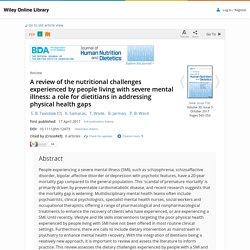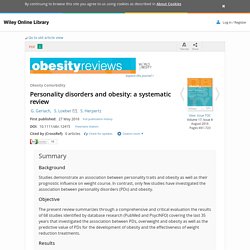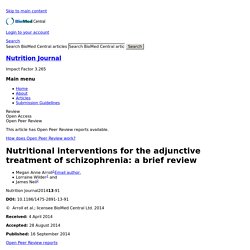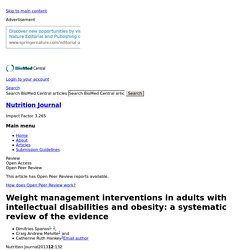

Diet, Stress and Mental Health. 2.1.

Effects of Diet on Health In the past forty years, there has been a remarkable increase in worldwide obesity [20,21], which has been associated with an increase in type-2 diabetes and cardiovascular disease [22,23]. The increase in obesity is likely secondary to an expansion of the Western diet, which includes higher amounts of omega-6 relative to omega-3 fatty acids relative to other diets, largely through the substitution of carbohydrates in the form of grains for leafy plants, represented by ubiquitous processed foods [24]. Factors including an increase in perceived stress and a shift in the labor force from manual labor to sedentary occupations have also likely contributed to overeating (including binge eating) and the growth in obesity [2,25].
Probiotics and the Microbiota-Gut-Brain Axis: Focus on Psychiatry. 1.Sender R, Fuchs S, Milo R.

Revised estimates for the number of human and bacteria cells in the body. PLoS Biology. 2016;14(8):e1002533–e. PubMed PubMed Central Google Scholar 2.Roger AJ, Muñoz-Gómez SA, Kamikawa R. The origin and diversification of mitochondria. Nutrition interventions in populations with mental health conditions: a scoping review - Applied Physiology, Nutrition, and Metabolism. Stephana J.

Cherak,abcd Kirsten M. Nutritional psychiatry: Towards improving mental health by what you eat. Agrawal and Gomez-Pinilla, 2012 R.

Agrawal, F. Gomez-Pinilla‘Metabolic syndrome’ in the brain: deficiency in omega-3 fatty acid exacerbates dysfunctions in insulin receptor signalling and cognition J. Physiol., 590 (2012), pp. 2485-2499 Ahmed et al., 2014 T. Ann. Algarin et al., 2017. Pathways linking obesity to neuropsychiatric disorders. Weight Gain During Treatment of Bipolar Disorder (BD)—Facts and Therapeutic Options. Introduction Bipolar disorder (BD) is a mood disease, which is characterized by alternating affective states between the poles of euphoria or dysphoria, euthymia, and depression (1, 2).

Symptoms of mania include over at least 7 days of euphoria or dysphoria or increased energy as major symptoms, and additional symptoms like inflated self-esteem or grandiosity, decreased need for sleep, logorrhea, flight of ideas, racing thoughts, distractibility, increased goal-directed activities, excessive involvement in pleasurable activities that have a high potential for painful consequences (e.g., like unrestrained buying sprees or foolish business investments). The latter symptoms can also occur as sub-manic form in episodes of hypomania not causing psycho-socio-economic damages.
Diet and Psychosis: A Scoping Review. Position : Nutrition Services for Individuals with Intellectual and Developmental Disabilities and Special Health Care Needs. It is the position of the Academy of Nutrition and Dietetics that nutrition services provided by registered dietitian nutritionists and nutrition and dietetics technicians, registered, who work under registered dietitian nutritionist supervision, are essential components of comprehensive care for all adults with intellectual and developmental disabilities and children and youth with special health care needs.

Developmental disabilities, including intellectual disabilities, are severe, lifelong disabilities attributable to mental and/or physical impairments manifesting before age 22 years and likely to continue indefinitely. The estimated total number of children and adults with intellectual and developmental disabilities (IDD) in the United States is approximately 1% to 3% (prevalence of 15.8 people per 1,000).2 Of this, an estimated 600,000 to 1.6 million are elderly (aged 60 years or older) and this number is expected to grow to several million by 2030.2 Public Policy. A review of the nutritional challenges experienced by people living with severe mental illness: a role for dietitians in addressing physical health gaps - Teasdale - 2017 - Journal of Human Nutrition and Dietetics.
Abstract People experiencing a severe mental illness (SMI), such as schizophrenia, schizoaffective disorder, bipolar affective disorder or depression with psychotic features, have a 20-year mortality gap compared to the general population.

This ‘scandal of premature mortality’ is primarily driven by preventable cardiometabolic disease, and recent research suggests that the mortality gap is widening. Multidisciplinary mental health teams often include psychiatrists, clinical psychologists, specialist mental health nurses, social workers and occupational therapists, offering a range of pharmacological and nonpharmacological treatments to enhance the recovery of clients who have experienced, or are experiencing a SMI. Until recently, lifestyle and life skills interventions targeting the poor physical health experienced by people living with SMI have not been offered in most routine clinical settings. Understanding severe mental illness. Nutritional Psychiatry: Where to Next? Personality disorders and obesity: a systematic review - Gerlach - 2016 - Obesity Reviews. Background Studies demonstrate an association between personality traits and obesity as well as their prognostic influence on weight course.

In contrast, only few studies have investigated the association between personality disorders (PDs) and obesity. Objective The present review summarizes through a comprehensive and critical evaluation the results of 68 studies identified by database research (PubMed and PsycINFO) covering the last 35 years that investigated the association between PDs, overweight and obesity as well as the predictive value of PDs for the development of obesity and the effectiveness of weight reduction treatments. Nutritional interventions for the adjunctive treatment of schizophrenia: a brief review. Only peer-reviewed studies were considered.

Human study designs included were Systematic Reviews, Randomised Controlled Trials (double-blinded or otherwise), Cohort studies, Case-Controlled studies and Case Reports. Pubmed, Google Scholar and Science Direct were used to search for relevant studies relating to schizophrenia and nutrition. Additionally, references were followed up and key papers obtained. Weight management interventions in adults with intellectual disabilities and obesity: a systematic review of the evidence. Similar to other reviews [3, 4, 5, 6], a limited number of studies in lifestyle weight management for adults with ID and obesity were found.

In general, over the years people with ID and obesity have had a minimal involvement in research [39] despite expressing their interest to participate [40]. There is no research examining the specific reasons of exclusion of individuals for ID from weight management studies. However, this can be explained by the already identified challenges in developing research for adults with ID, especially in relation to ethics. Several studies and ethics committees have looked at the ethical issues related to the types of interventions provided to people with ID, reporting the necessity of interventions tailored to the needs of the participants and reviewing the principles and procedures that need to be followed when individuals with ID have not the capacity to consent their participation in a study [41].
Methodological limitations Limitations of the review. Nutrition and Mental Health - Dietitians of Canada. Www.dietitians.ca/mentalhealth Background “Mental health is an integral part of health; indeed, there is no health without mental health.” (World Health Organization, 2010) Nutrition initiatives, as part of collaborative programs for mental health promotion, can support and promote mental health by enhancing social inclusion, self-reliance, food security, and healthy body image, while reducing health and social inequities. Nutrition interventions, provided by registered dietitians to individuals with mental health conditions and their care providers, can lead to reduced nutrition-related side effects of psychiatric medications, better self-management of concurrent and comorbid conditions, and improved function overall.
Position. Cancer screening, prevention, and treatment in people with mental illness - Weinstein - 2015 - CA: A Cancer Journal for Clinicians. Abstract Answer questions and earn CME/CNE People with mental illness die decades earlier in the United States compared with the general population. Most of this disparity is related to preventable and treatable chronic conditions, with many studies finding cancer as the second leading cause of death. Individual lifestyle factors, such as smoking or limited adherence to treatment, are often cited as highly significant issues in shaping risk among persons with mental illness. International Society for Nutritional Psychiatry Research consensus position statement: nutritional medicine in modern psychiatry - Sarris - 2015 - World Psychiatry. In recent years, there has been an unprecedented growth in both the quantity and methodological quality of research directed at exploring the relationship between nutrition and mental health.
Indeed, the strength of data has now afforded nutritional medicine a place in the mainstream psychiatric discourse [1]. Robust associations have been established between nutritional quality and mental health, with the bulk of this evidence indicating a protective effect of healthy diets on depressed mood [2], and the newest research supporting a detrimental impact of unhealthy diets on the mental health of young people [3, 4] and adults [5, 7]. There are also convincing data supporting the application of certain nutrient-based supplements (nutraceuticals) as monotherapy or combined therapy [8], or as augmentation therapy [9]. Although the growth in scientific research related to nutrition in psychiatry may be recent, it is now at a stage where it can no longer be ignored.